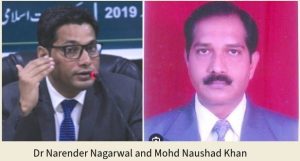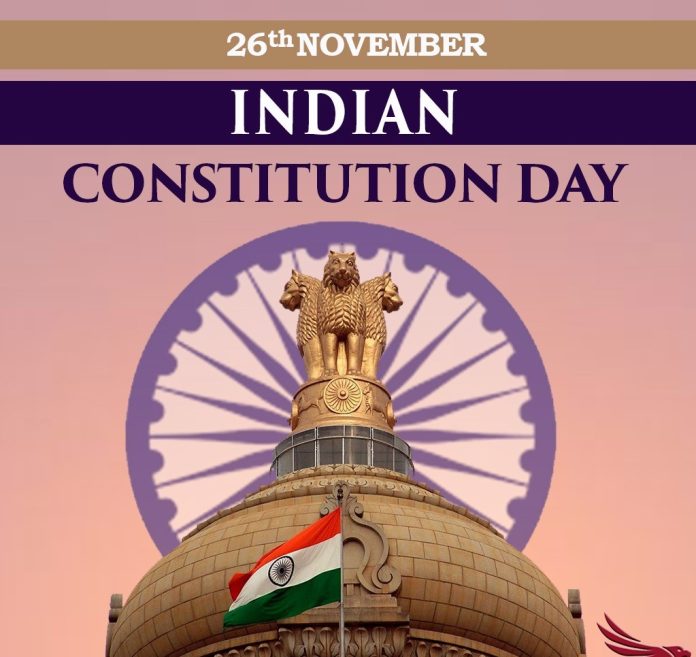
– Dr Narender Nagarwal and Mohd Naushad Khan
Constitution Day, also referred to as Samvidhan Divas in India, is a momentous occasion commemorating the adoption of India’s Constitution on November 26, 1949. This day holds immense historical importance as it signifies the realization of our founding fathers’ tireless efforts and vision for a sovereign, socialist, secular, and democratic nation.
As we observe Constitution Day, it is imperative that we move beyond the ritualistic aspects of celebration and delve into the core values and principles that our Constitution embodies. Despite the grandeur of our annual November 26 celebrations, it is crucial to introspect whether we have truly looked beyond surface-level rituals, tokenism, and symbolism.
The Constitution of India, enacted by the nation’s founding fathers, embodies progressive ideals such as equality, liberty, and justice. Nonetheless, the implementation of these principles has been uneven, and recent developments have raised concerns over the erosion of these fundamental values enshrined in our Constitution. The rise of majoritarian nationalism, which seeks to impose a uniform Hindu identity on India’s diverse population, has contributed significantly to this decline. This ideology has fuelled the erosion of secularism, rich composite cultural heritage, and fraternity resulting in unprecedent violence against religious and ethnic communities, caste-based discrimination, and marginalization of vulnerable sections, especially Dalits.
The erosion of autonomy of the institutions, particularly the judiciary and media, is a pressing concern that forces us to reconsider the vision of India’s founding fathers. These institutions play a vital role in upholding constitutional values and protecting the rights of all citizens. However, recent efforts to undermine their autonomy have sparked fears about the erosion of essential checks and balances crucial to a healthy democracy. In 2018, four Supreme Court judges made scathing criticisms of unwarranted government interference in the day-to-day administration of justice, calling it a black day for the Indian judiciary.
Indian media has lost its credibility completely and it is disheartening that the Indian media has received a shameful ranking in the 2022 World Press Freedom Index which can be termed as the deep decline of constitutional values of fundamental rights of speech and expression.
The shrinking space of freedom of religion for the minorities of India is another area of concern to introspect on how to preserve constitutional ideas and its core philosophy. The shrinking of religious freedom has been particularly acute for India’s minority communities, including Muslims, Christians and Sikhs. These groups face increasing discrimination, violence, and intimidation, often at the hands of extremist groups and individuals emboldened by the rise of majoritarian nationalism. One of the most visible manifestations of this shrinking religious freedom is the rise of cow vigilantism, where self-proclaimed Hindutva protectors lynch Muslims suspected of consuming or trading beef. These incidents have created a climate of fear and insecurity among Muslims, eroding their sense of belonging and safety.
Another alarming trend is the targeting of minority-run educational institutions, which are often accused of proselytizing or converting students. These institutions, which play a vital role in providing education and social upliftment to minority communities, face harassment, closure, and even demolition.
The true essence of Constitution Day lies in upholding the core principles and ideas of the Constitution, rather than mere token gestures. We must not forget the social responsibility that comes with it. Recent years have seen numerous instances where both state and non-state actors have attacked these very principles. The rising graph of communal violence, intolerance, and ethnic conflicts are such an issue that needs to be settled on priority-wise.
Likewise, the last decade has witnessed numerous instances of mob lynching and targeted attacks on minorities and their places of worships which is in direct question to the basic ideals of the Constitution of India and its core philosophy. While there is much talk about fundamental rights, we often overlook the equally important fundamental duties outlined in Article 51A of the Indian Constitution. It is concerning that some of these duties, such as promoting a sense of fraternity among citizens, are being compromised. Fraternity represents a spirit of brotherhood and commonality that goes beyond individual affiliations and interests. It is alarming that this very idea is being eroded by those who are supposed to uphold it.
In order to uphold the importance of fundamental duties in promoting social mobility and fostering social peace, harmony, and mutual societal interactions, it falls upon the government to play a significant role in maintaining the social fabric of a heterogeneous society. These fundamental duties, which include preserving our rich diverse cultural heritage, and minorities’ interests, promoting brotherhood, and rejecting all forms of violence, are closely tied to the vision set forth in the Preamble of ensuring justice, liberty, equality, and fraternity for all citizens. The duty to promote fraternity emphasizes the interconnectedness of individuals and their shared destiny. By fostering a sense of brotherhood, citizens contribute to the creation of a just and egalitarian society, reducing social divisions and promoting a collective commitment to the welfare of all.
Perhaps one of the most critical duties outlined in Article 51A is the injunction to renounce practices derogatory to the dignity of women and abjure violence of all sorts. This duty reflects a commitment to non-violence, echoing the teachings of Mahatma Gandhi and other leaders of the Indian independence movement. The duty to abjure violence is fundamental to the establishment of a just and peaceful society. By renouncing violence in all forms, citizens contribute to the creation of a safe and secure environment for everyone. This duty aligns with the constitutional goal of ensuring the dignity of the individual and upholding the principles of justice and equality.
It is imperative to understand that our actions should be aligned with the spirit of the Constitution. We must cultivate a sense of civic responsibility among our fellow citizens irrespective of caste, creed, language and religion, encouraging them to actively engage with societal issues and contribute to the betterment of our nation. Furthermore, let us strive to create an environment where diversity is celebrated, where every voice is heard, and where ideas can flourish without fear. The Constitution envisions a society where the dignity of the individual is paramount, and as educators, we must instil this principle in the hearts and minds of our citizens.
Our Constitution is not a mere legal document; it is the soul of our nation, embodying the principles that guide our collective existence. It lays down the fundamental rights and duties of citizens, ensuring justice, liberty, equality, and fraternity. It is a living document that adapts to the evolving needs of our society, yet stands firm as a beacon of hope and justice.
Let’s not view Constitution Day as a mere formality but as an opportunity to reaffirm our commitment to the ideals enshrined in our Constitution. Let us pledge to be active participants in the preservation of the constitutional ideas and core values that define the soul of our great nation. May the spirit of secularism, social justice, and communal harmony continue to guide us in our collective journey toward a brighter and more inclusive future.
[Dr Narender Nagarwal teaches Law at Delhi University and Mohd Naushad Khan is Sub-Editor of Radiance]




